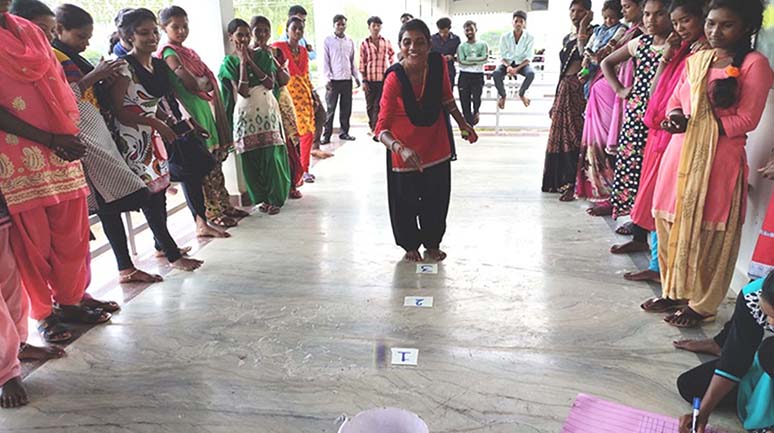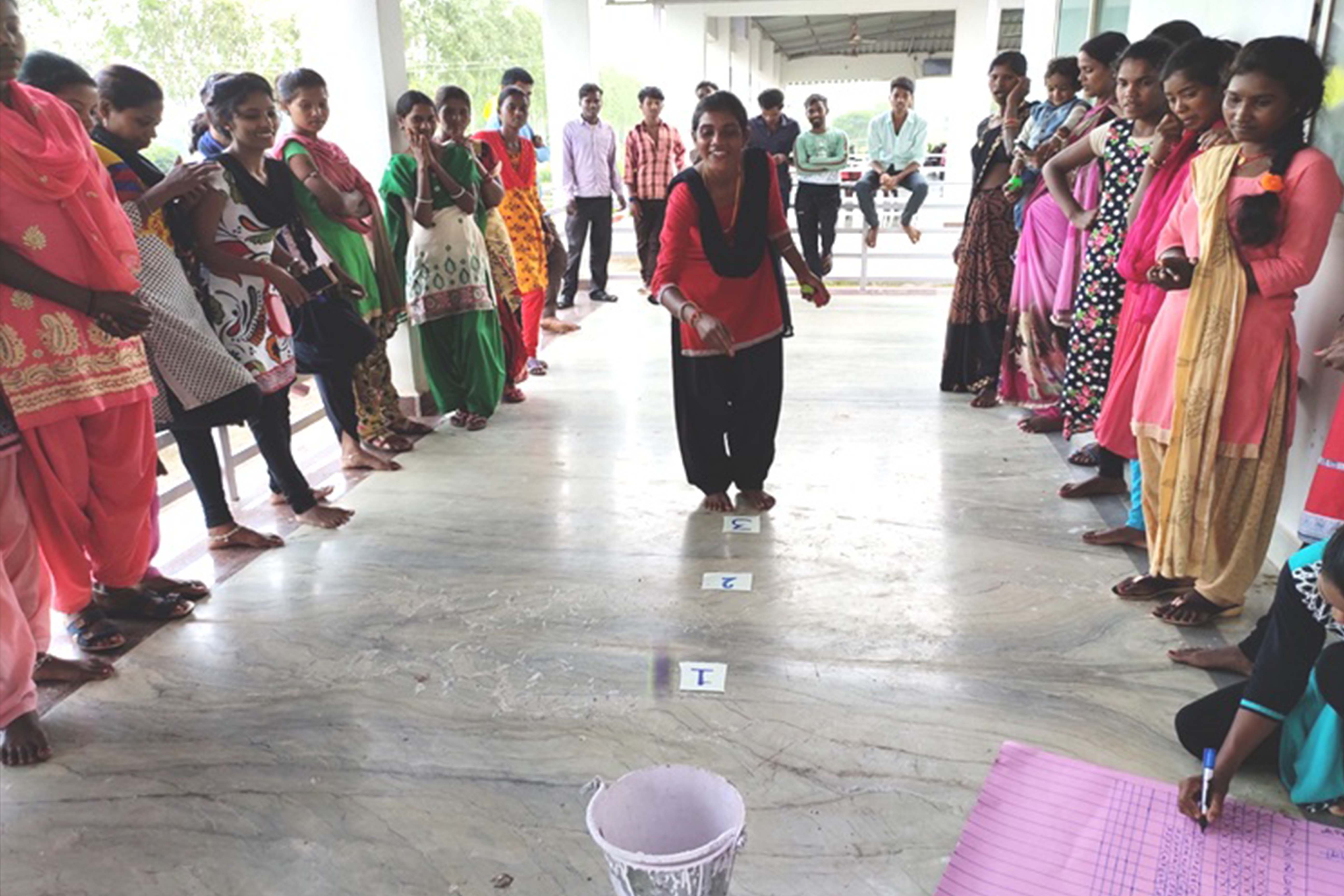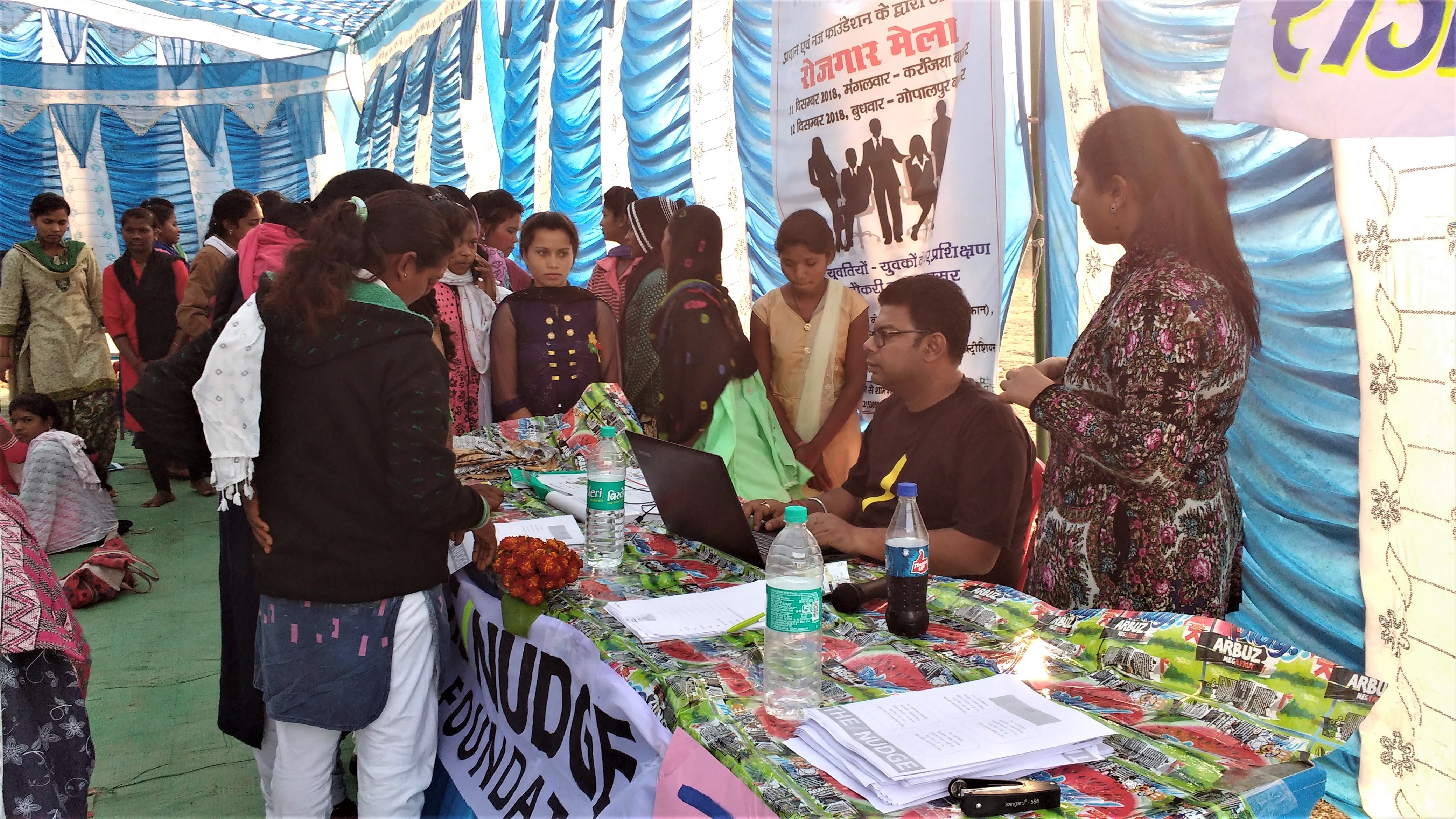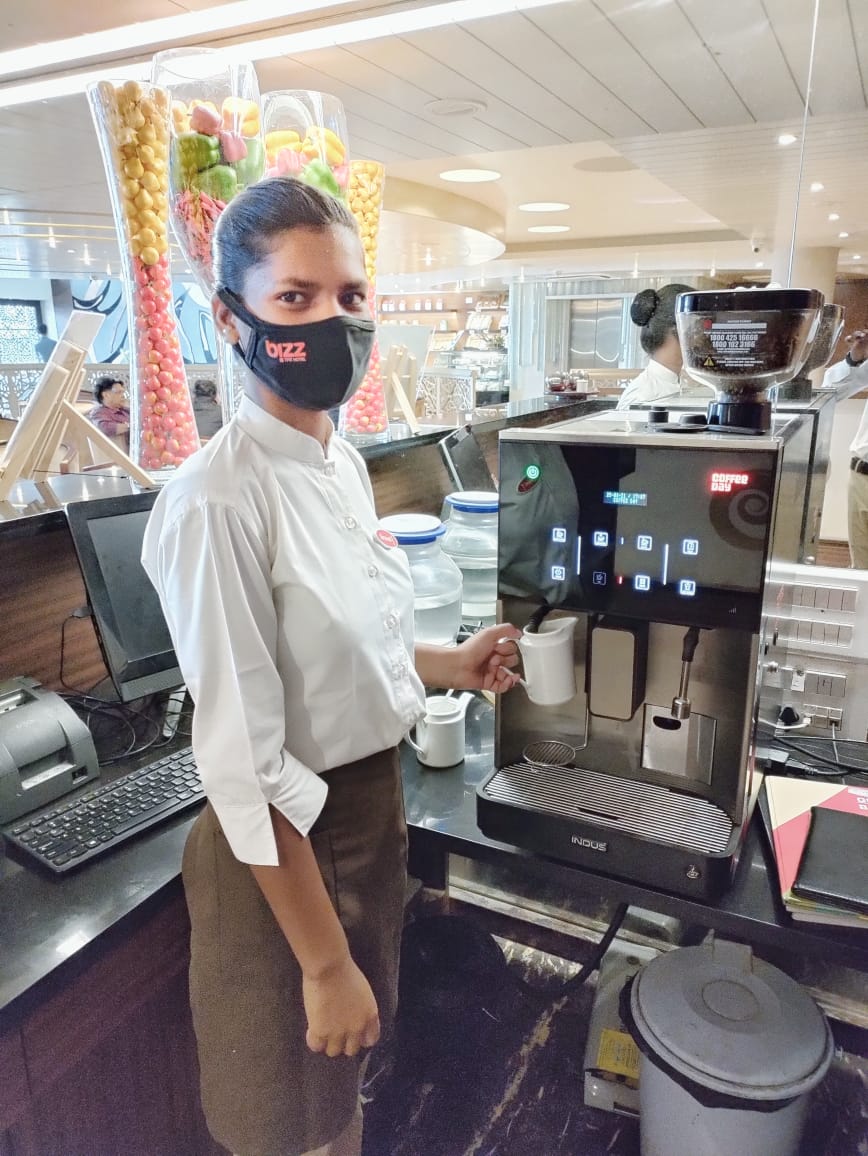Yuwashastra Programme in Karanjia – Reimagining the Future

Identifying the aspirations of the rural youth, helping them look at the world of possibilities and providing training and guidance in their preferred choices is one way of ensuring the optimum use of the human potential, leading to nation building

Young adults playing the Ring Toss Game to assess their risk-taking ability at the 'Reimagining the Future' Workshop in Karanjia | Picture Courtesy: Barkha Tanvir
I joined the Karanjia team in PRADAN in 2016. Karanjia is a block in Dindori district in Madhya Pradesh. When working in the villages with my colleagues, I found that we had to constantly struggle to get things done, including mobilizing women into Self Help Groups (SHGs), convincing them of the benefits of collectivizing, working on livelihoods training in new technologies and methods, convincing the community to adopt these technologies for increased yield and income, etc.
We soon discovered that women, invariably, took on the responsibility for all these activities, fighting desperately against time, to better their living conditions. For women,who busied themselves with work all through the day, it seemed as if the number of hours in a day were inadequate. Most evident, as well as most bizarre, was the fact that the youth in the village seemed to have nothing but time on their hands! The women expressed their concern and worry about this casual attitude of their children.
When we, in the PRADAN team, engaged with the youth, a whole new world about the minds and lives of these young adults opened up for us. Their underlying, exuberant energy attracted us to them. Once we had their trust, we learned that young Umeshwari wanted to learn stitching but her family was not able to financially support her; Mansaram wanted to become an expert technician but had failed his 12 th exams; Namina wanted to become a nurse and help people but needed to stay at home to take care of her mother; Mahendra wanted to run his own business but didn’t know how to begin; and there were many girls like Chhavli, who didn’t want to do anything because they were going to get married and had been told to focus on house work.
We found that there were gaps in the dreams and aspirations of these young people and the chances of achieving them. These ranged from limited exposure, limited opportunities, low education level, lack of family support, tragedies at home to financial struggles, poor connectivity in off-road villages, caste and gender biases, and the lack of articulation of their aspirations.
There were gaps in the dreams and aspirations of these young people and the chances of achieving them. These ranged from limited exposure, limited opportunities, low education level, lack of family support, tragedies at home to financial struggles, poor connectivity in off-road villages, caste and gender biases
The Karanjia team realized the need to engage with the youth to bridge those gaps. We got the idea from Yuwashastra programme, a youth programme piloted by PRADAN in Mohgaon block of Mandla district. Taking the learnings from this programme, a similar programme for youth development was initiated in Karanjia block in 2016.
We started discussions in those SHGs that had expressed concern about their children and wanted a meaningful programme to be run for them in the village. The women helped mobilize the youth (between 18 and 30 years of age) of one village. To encourage participation, sports events were conducted for them. This was followed by focused group meetings, to understand what excites them and the issues that were of concern to them. Such group meetings and discussions helped build trust, gave them a platform to share their inner selves and learn about each other. They showed interest in forming such youth groups in the village.
One of the major obstacles we decided to work on was the poor information flow. Young people staying far away from the block or district headquarters did not get information about most of the opportunities available or received this information late. The Village Organizations elected a Yuwa Sakhi, a woman leader, who coordinates with the youth in the village. These Yuwa Sakhis formed a network, to spread information in a timely manner about any new opportunity for or demand of the villagers.
Those who showed interest in becoming a part of this programme were invited to a five-day “Reimagining the Future” workshop. This was designed to help individuals identify their aspirations, strengths, potential, risk-taking ability, career intent and resources available to them for a fulfilling, realistic career. Initially, PRADAN ran this workshop till it standardized the module; then PRADAN trained youth service providers and trainers from the community to conduct these trainings. The workshop is a mix of classroom sessions, games, improvisations, movie screenings, group and individual activities. On the third day, we worked to build an understanding of the larger society they are a part of, which plays a part in the life decisions of the youth; on gender discrimination leading to domestic violence; caste-based discrimination and the existing economic and educational inequalities, among other issues. These five days gave them exposure to a plethora of career choices available in this world and to people and their lifestyles from outside their own village.
Following the workshop, the youth began to voice their aspirations with greater ease and to hold dialogues among themselves and in their peer group about their future. Before this intervention, the most common wish of the girls was to take up tailoring or nursing, and many did not think of a career at all. Boys would limit their choices to farming, running a business or learning basic computer skills. Some of the career choices that emerged after the workshop among girls were acting, farming, setting up a business, law, cosmetology, sports, mechanics, call centre services, medicine, hospitality, painting, higher studies or any good job. For boys some of the choices were house painting, hospitality, photography, tailoring, any government or private job, police, farming, sports and call centre services.
A week after this exploration and narrowing in on their passion, PRADAN conducted career counselling sessions for them and some of the parents. This was to test their aptitude, to lay out career options related to their passion and aptitude, and to help them make informed choices. Career counsellors first underwent a three-day personal counselling training. Some team members and some academics from the community facilitated the sessions.
We saw a pattern emerge in the results of the aptitude test; girls scored higher than the boys in social, artistic and investigative (academic) fields whereas boys scored higher in the enterprising, conventional and realistic (tactile) fields, including as data operators, farmers, and technicians, and in government office jobs. Often, there is a mismatch in their aptitude and passion or between their qualification and passion. In such cases, we discuss their qualifications and the path to follow their passion, and suggest viable options based on their aptitude, giving them the choice to follow both. There were times when the parents did not agree with their children’s choice or vice versa. We then held multiple counselling sessions with both parties present and facilitated discussions between them, to reach the best solution.
After an informed choice had been made, we made external linkages with training and placement partner institutes such as The Nudge Foundation in Bangalore and Delhi, and Pratham Arora Centre for Education (PACE) in Bhopal for skill building.

Youth interacting with the partner organizations in a Rozgar Mela. The event helps them explore different career options. | Picture Courtesy: Barkha Tanvir
We found them opportunities as close to their passion as possible, keeping in mind their qualifications. We encouraged the young adults and their families to attend an on- or off-the-job training programmes in a vocation of their choice. This was followed by an assured placement in a good job. This broke the barrier of limited opportunities and exposure, and equipped the individual to get a secure and dignified job that was aligned with their interest, aptitude and qualification.
Many young men and women from rural backgrounds are not able to pursue a career of their choice because of some limitations, including their not having the finances to do so. Yuwashastra established links with training institutes, which offered students scholarship for the tenure of their training and also helped them find placement at the highest salary possible. This means that the students had to pay only a token amount to book their seat for the programme, which would then be used for their travel to the location.
Yuwashastra has impacted many young lives. Khemraj from Medhakhar was trained as a call centre executive with our training partner, The Nudge Foundation, and has been working in a Jio Care office for almost two years. Saraswati Dhurwey from Khamarkhudra was trained in hospitality by PACE, Bhopal, and has been working in hotels for three years and is a senior stewardess at Bizz, a hotel in Rajkot, Gujarat. Surabhi Chandel wanted to become a nurse but did not have the resources for a nursing degree. She graduated with a Diploma in Ophthalmic Assistance with our partner Sankara Eye Hospital.

Saraswati Dehury works as a Senior Stewardess in a 4-Star Hotel in Rajkot, Gujarat. She is enroute to a managerial position and is a role model for all girls in the Yuwashastra programme | Picture Courtesy: Barkha Tanvir
After having joined Yuwashastra and having worked for a while, there is a sea change in their personalities. They are no longer shy; on the contrary, they are confident, articulate and financially astute. Some have also become a part of the decision-making in their families.
Many of the young adults found the training programmes that matched their aspirations, and the results were eye-opening. Whereas a third of the boys dropped out without completing their training, only a tenth of the girls dropped out before completing their training. The difference in the rate of dropouts increased during placement. More than one-fourth of the boys placed did not join the job whereas only 5 per cent of the girls who got placed did not join.
The biggest challenge we faced was in convincing the youth (and their parents) to move out of the village for training or a job. Young women could not imagine a life outside their villages and without their parents. Even if the prospect of something new excited them, it was also scary. Parents are afraid about the safety of their daughters and worried about their daughters becoming promiscuous and bringing shame to the family. For girls, it was a challenge till they left. This took many rounds of one-on-one counselling with the girl, group counselling with their families, and discussions in the SHGs. What worked well was if a large number of girls were going to the same place in a group from the same village or the same block.
Once they left, however, their retention was high. They enjoyed the new freedom and responsibility for their own choices and not having to do the mundane housework day after day.
For boys, retention after they left for training was a challenge. The most common reasons were not earning while in training and missing home. We could not do much about missing home except to arrange for a larger number of boys from the same village to go as a group. Many young men from the villages in Karanjia are familiar with migrating for work to a ‘company’ to earn money for a few months of the year. They work as daily wage labour, which is hard work, and get paid when they leave. Not earning money from day one of being away from home was a continuing challenge, for which we found opportunities of on-the-job training in some trades. What was required for both was post placement support through our cadre and getting involved ourselves as well.
By 2021, we conducted the ‘Reimagining the Future’ workshop with 754 youth across 31 villages, of which 539 were women. Of these, 384 youth and their parents were given rigorous career counselling and mentoring support to make a suitable career choice. Finally, close to 200 youth got trained in their choice of vocation through Yuwashastra in Karanjia.
Having worked with SHG women, it’s frustrating at times to realize that they are trapped in that life in some ways. Yet, we will continue our work with them for a more just society in the future. We want to empower the youth before they start their own families and have additional responsibilities, to make room for a bigger change. Having very little exposure to cultures other their own and role models and their parents, it’s hard not to repeat mistakes. It is important to work with the youth, to break the cycle of poverty and injustice.
We also focused on creating and promoting local area livelihood opportunities as a larger number of youth wanted to find work near or at home. These were mostly farm-based, such as commercial vegetable and mushroom cultivation, para-veterinary services and livestock rearing. Some were off farming; they ran small businesses such as a grocery shop, cosmetic shop, tailor shop, or mill. Even though there was higher participation in these activities, the output and income generated was much lower. There were issues of land disputes, small land holdings and lack of a steady market for the various produce in order to make a living and have some savings. Individual landholding has been reducing steadily and will continue to do so with time. Anchoring every rural individual’s livelihood to their landholding will not be sustainable in the long run. Most off-farm enterprises are not able to generate regular income, to sustain a household year-round. This is because the revenue generated by these are from within the village, where the average household income is low as, therefore, is their purchasing power. The youth today need to learn a skill besides farming and small businesses, to have more livelihood options, to break the poverty cycle.
Convincing the youth and their families to step outside the comfort of conventional rural life and experience new ways to earn a living will remain an uphill battle. This is why more people need to engage with today’s youth. With the pandemic-induced return of the migrants, it is even more crucial to work in this sector and secure livelihoods, leading to a promise of a dignified life.

